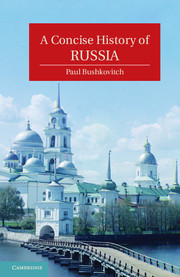Book contents
- Frontmatter
- Contents
- List of Figures
- Abbreviations
- Acknowledgments
- Prologue
- 1 Russia before Russia
- 2 Moscow, Novgorod, Lithuania, and the Mongols
- 3 The Emergence of Russia
- 4 Consolidation and Revolt
- 5 Peter the Great
- 6 Two Empresses
- 7 Catherine the Great
- 8 Russia in the Age of Revolution
- 9 The Pinnacle of Autocracy
- 10 Culture and Autocracy
- 11 The Era of the Great Reforms
- 12 From Serfdom to Nascent Capitalism
- 13 The Golden Age of Russian Culture
- 14 Russia as an Empire
- 15 Autocracy in Decline
- 16 War and Revolution
- 17 Compromise and Preparation
- 18 Revolutions in Russian Culture
- 19 Building Utopia
- 20 War
- 21 Growth, Consolidation, and Stagnation
- 22 Soviet Culture
- 23 The Cold War
- Epilogue
- Further Reading
- Index
13 - The Golden Age of Russian Culture
Published online by Cambridge University Press: 05 June 2012
- Frontmatter
- Contents
- List of Figures
- Abbreviations
- Acknowledgments
- Prologue
- 1 Russia before Russia
- 2 Moscow, Novgorod, Lithuania, and the Mongols
- 3 The Emergence of Russia
- 4 Consolidation and Revolt
- 5 Peter the Great
- 6 Two Empresses
- 7 Catherine the Great
- 8 Russia in the Age of Revolution
- 9 The Pinnacle of Autocracy
- 10 Culture and Autocracy
- 11 The Era of the Great Reforms
- 12 From Serfdom to Nascent Capitalism
- 13 The Golden Age of Russian Culture
- 14 Russia as an Empire
- 15 Autocracy in Decline
- 16 War and Revolution
- 17 Compromise and Preparation
- 18 Revolutions in Russian Culture
- 19 Building Utopia
- 20 War
- 21 Growth, Consolidation, and Stagnation
- 22 Soviet Culture
- 23 The Cold War
- Epilogue
- Further Reading
- Index
Summary
The development of Russian society in the reform era profoundly affected Russian culture, both by changing the institutional environment of culture and by calling forth new intellectual and artistic impulses. For almost all spheres of thought and creation, the period was the first great age of Russian culture, and the first one to bring that culture an audience beyond its boundaries. By the 1880s Russia had become part of the world, not just as a major political power but as a major contributor to the arts and even to science.
Science in the age of reform
Science had not flourished in the years of Nicholas I. While the universities did provide high-level instruction, the professors were often foreigners and facilities were small and inadequate. Lobachevskii's new geometry was the work of an isolated provincial professor whose calculations needed only his own genius and a pencil and paper. After the Crimean War, the government realized that the scientific level of the country needed to be raised, and the Ministry of Education provided for the expansion of science departments in the universities as part of a general upgrading of higher education. Equally or more important were the initiatives of the Ministry of Finance, especially its reorganization of the Technological Institute in St. Petersburg. A modern engineering school was crucial to the industrialization program, but the reformed curriculum had one unexpected result of worldwide significance. The young Dmitrii Mendeleev set out to provide a new, up-to-date chemistry course, and in the process found the existing textbooks unsatisfactory. He started to create his own, and in the process of looking for a way to explain the relationships among the various elements in nature, realized that they fit a certain pattern. The idea of a regularity was not absolutely new, but Mendeleev went further: he saw that there were gaps in the pattern and in 1869 he predicted that new elements would be found to exist that filled in these gaps. Soon scientists abroad found his prediction to be correct, and Mendeleev became Russia's foremost scientist. His fame endured on the walls of science classrooms ever after in the form of charts of the periodic table of the elements that came from Mendeleev's discovery.
- Type
- Chapter
- Information
- A Concise History of Russia , pp. 228 - 248Publisher: Cambridge University PressPrint publication year: 2011

